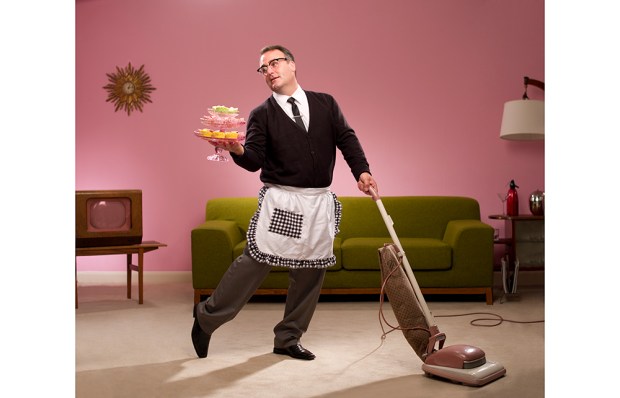Last Saturday I went to the opera for only the second time in my life. This was at the invitation of David Ross, my former boss at the New Schools Network, who hosts an arts festival called Nevill Holt Opera at his house in Leicestershire every summer. Launched in 2013, it is now a mainstay of the summer season, with the festival lasting until the end of June. The two operas this year are La bohème and The Barber of Seville.
Caroline and I were there to see the Puccini, but as anyone who’s attended an opera at a country house will tell you, the production itself is only part of the appeal. Guests are encouraged to arrive early so they can explore the gardens, and the tableau that greeted us when we got there at about 4.15 p.m. was like a scene from Four Weddings and a Funeral. Men and women in evening dress lounged on picnic rugs sipping champagne, while the afternoon sun bathed the surrounding countryside in an amber glow. I half expected a band to pop up and start playing ‘There’ll Always Be an England’.
The main event began at 5 p.m. in a stable block that’s been converted into a 400-seat opera house, including an orchestra pit. In preparation, I had read Caroline a synopsis of the story of La bohème on the way there, but it had left us both a bit underwhelmed. An opera in four acts, it begins as a fairly broad comedy, with a romantic plot and subplot, then, in Act III, with much grinding of gears, it lurches into a full-blown tragedy. Nearly all the characters are penniless artists living in Paris in the 1830s – hence the title – and the theme, as far as I could tell, is that the course of true love never runs smooth.
‘It sounds silly,’ said Caroline, and indeed it did. As Sylvia Fine Kaye pointed out, if you don’t speak Italian you’ll think opera is about something important. But when the story was told in song, accompanied by the Manchester Camerata orchestra, the base metal of Giuseppe Giacosa and Luigi Illica’s libretto was transformed into something magical. The cast was uniformly excellent, particularly the two leads, Peter Scott Drackley as Rodolfo and Francesca Chiejina as Mimi. I was expecting it to have a slightly am-dram feel, having never been to a country-house opera before, but the entire production was dripping with professionalism. It really was quite something.
As a novice, I initially found it tricky to understand the grammar of what was happening on stage. During each scene, the performers were constantly switching from telling each other how they felt to expressing their innermost feelings, with the two accounts often at odds. I imagine more experienced opera-goers can tell immediately what sentiment is supposed to be public and what is supposed to be private, but I kept thinking, ‘Hang on a minute. Aren’t you just the teensiest bit worried that when you sang about how you’re secretly in love with the person standing a few feet away they might have overheard you?’ But I gradually got the hang of it. The clue, as far as I can tell, is that if the characters are gazing into each other’s eyes, one hand resting on their hearts, they’re engaged in public declarations of love, but if they’ve turned away and one hand is resting on their heads, they’re confessing some terrible secret that the other person isn’t supposed to be able to hear.
One of the best things about the evening was that the interval lasted more than an hour, giving the audience time to consume a three-course meal before the beginning of the second half. During my five-year stint as The Spectator’s drama critic I never got used to having to wait until the play was over before eating supper and often found myself wolfing down crisps in the interval.
No need for that here. All over the garden, couples and groups of friends were either tucking into picnics on the lawn or sitting around tables in miniature marquees. It was less like a night at the theatre than a 50th birthday party for 400 people.
In the car on the way back to London, Caroline said she thought she’d left it too late in life to become an opera buff, but I felt I had caught a glimpse of why it is people love it so much. I don’t just mean the accompanying social hoopla, but the thing itself. I can see that familiarising myself with the art form will take a fair amount of work and mean less time spent watching Stranger Things and Better Call Saul. But I think it might be worth it.
Got something to add? Join the discussion and comment below.
Get 10 issues for just $10
Subscribe to The Spectator Australia today for the next 10 magazine issues, plus full online access, for just $10.
You might disagree with half of it, but you’ll enjoy reading all of it. Try your first month for free, then just $2 a week for the remainder of your first year.















Comments
Don't miss out
Join the conversation with other Spectator Australia readers. Subscribe to leave a comment.
SUBSCRIBEAlready a subscriber? Log in